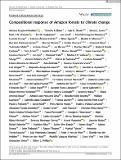Compositional response of Amazon forests to climate change
Abstract
Most of the planet's diversity is concentrated in the tropics, which includes many regions undergoing rapid climate change. Yet, while climate-induced biodiversity changes are widely documented elsewhere, few studies have addressed this issue for lowland tropical ecosystems. Here we investigate whether the floristic and functional composition of intact lowland Amazonian forests have been changing by evaluating records from 106 long-term inventory plots spanning 30 years. We analyse three traits that have been hypothesized to respond to different environmental drivers (increase in moisture stress and atmospheric CO2 concentrations): maximum tree size, biogeographic water-deficit affiliation and wood density. Tree communities have become increasingly dominated by large-statured taxa, but to date there has been no detectable change in mean wood density or water deficit affiliation at the community level, despite most forest plots having experienced an intensification of the dry season. However, among newly recruited trees, dry-affiliated genera have become more abundant, while the mortality of wet-affiliated genera has increased in those plots where the dry season has intensified most. Thus, a slow shift to a more dry-affiliated Amazonia is underway, with changes in compositional dynamics (recruits and mortality) consistent with climate-change drivers, but yet to significantly impact whole-community composition. The Amazon observational record suggests that the increase in atmospheric CO2 is driving a shift within tree communities to large-statured species and that climate changes to date will impact forest composition, but long generation times of tropical trees mean that biodiversity change is lagging behind climate change.
Citation
Esquivel-Muelbert , A , Baker , T R , Dexter , K G , Lewis , S L , Brienen , R J W , Feldpausch , T R , Lloyd , J , Monteagudo-Mendoza , A , Arroyo , L , Álvarez-Dávila , E , Higuchi , N , Marimon , B S , Marimon-Junior , B H , Silveira , M , Vilanova , E , Gloor , E , Malhi , Y , Chave , J , Barlow , J , Bonal , D , Davila Cardozo , N , Erwin , T , Fauset , S , Hérault , B , Laurance , S , Poorter , L , Qie , L , Stahl , C , Sullivan , M J P , ter Steege , H , Vos , V A , Zuidema , P A , Almeida , E , Almeida de Oliveira , E , Andrade , A , Vieira , S A , Aragão , L , Araujo-Murakami , A , Arets , E , Aymard C , G A , Baraloto , C , Camargo , P B , Barroso , J G , Bongers , F , Boot , R , Camargo , J L , Castro , W , Chama Moscoso , V , Comiskey , J & Honorio Coronado , E 2018 , ' Compositional response of Amazon forests to climate change ' , Global Change Biology , vol. 25 , no. 1 , pp. 39-56 . https://doi.org/10.1111/gcb.14413
Publication
Global Change Biology
Status
Peer reviewed
ISSN
1354-1013Type
Journal article
Description
Funding Information: Natural Environment Research Council (NERC), Grant/Award Number: NE/ N004655/1; NERC Consortium Grants “AMAZONICA”; BIO‐RED; European Research Council (ERC); The Gordon and Betty Moore Foundation; European Union's Seventh Framework Programme, Grant/ Award Number: 282664; Royal Society, Grant/Award Number: CH160091; Royal Society Wolfson Research Merit Award.Collections
Items in the St Andrews Research Repository are protected by copyright, with all rights reserved, unless otherwise indicated.

